22 Feb2021
By Laura Geringer and Jacqueline Rodriguez
 CoSN, the national association of school district technology leaders, recently released two reports, Driving K-12 Innovation: 2021 Hurdles + Accelerators and Driving K-12 Innovation: 2021 Tech Enablers. The Driving K-12 Innovation reports capture the top nine topics (challenges, mega-trends, and tools), according to an advisory board of approximately 100 school leaders, technologists, educators, and changemakers. AACTE was proud to serve on the advisory board that supported the development of the report for the second year in a row.
CoSN, the national association of school district technology leaders, recently released two reports, Driving K-12 Innovation: 2021 Hurdles + Accelerators and Driving K-12 Innovation: 2021 Tech Enablers. The Driving K-12 Innovation reports capture the top nine topics (challenges, mega-trends, and tools), according to an advisory board of approximately 100 school leaders, technologists, educators, and changemakers. AACTE was proud to serve on the advisory board that supported the development of the report for the second year in a row.
Through the Driving K-12 Innovation series, CoSN continues its commitment to sharing high-quality trend reports that support the use of emerging technology in K-12 education to transform learning. In this initiative, a global advisory board of K-12 leaders, practitioners, and changemakers engages in discourse about the major themes driving, hindering, and enabling teaching and learning innovation at schools. Their work is divided into three steps: an initial survey to select the topics for discussion; discussion; and a concluding survey to capture the final thoughts from advisory board members and discern the top topics to feature in each publication. (Learn more at cosn.org/k12innovation.)
17 Dec2020
By Ruth Campbell
This article originally appeared in Odessa American and is reprinted with permission.
University of Texas Permian Basin’s new certification program in early childhood prekindergarten through third grade education has one semester in the books.
Dean of the College of Education Larry Daniel said they have 11 to 12 students in that major.
“It’s our first semester this fall, so we’re expecting that program to continue to grow. I know we’ve had a lot of inquiries but I don’t have a precise figure. … We are expecting that program to continue to grow and having teachers certified, particularly with the early childhood area,” Daniel said during a Zoom Early Childhood Action Network meeting this week.
ECAN is a committee of the Education Partnership of the Permian Basin. The Education Partnership of the Permian Basin is a nonprofit organization focused on supporting and improving the quality of education throughout the Permian Basin from cradle to career, its website said.
16 Nov2020
By Jane E. West
This blog post is written by AACTE consultant Jane West and is intended to provide updated information. The views expressed in this post do not necessarily reflect the views of AACTE.
Welcome to the world of President-elect Joe Biden and VP-elect Kamala Harris.
What Might a Biden Presidency Mean for Education?
When President-elect Joe Biden told the nation that educators will have “one of their own” in the White House, a sigh of relief and a whiff of optimism were palpable among the education community. Referring to his wife, Jill Biden—a long time community college professor—he also said that “teaching isn’t just what she does, it’s who she is.” Thus, the president-elect sets the tone for the next four years of one of the most pro-education administrations in our lifetimes.
Biden named his transition teams this week, including the one for education. Led by Linda Darling-Hammond, president of the Learning Policy Institute and former head of the Obama Administration education transition team, the group is comprised of a number of former Obama appointees as well as union leaders. The team is working on compiling both potential nominees for political positions in the Department of Education as well as fleshing out policy priorities and a timeline.
15 Oct2020
By Martha Spieker
The following article features comments by AACTE President and CEO Lynn M. Gangone on behalf of the Association in support of the legislation.

Senator Mazie K. Hirono (D-Hawaii), along with her colleague Senator Cory Booker (D-N.J.) announced their plan to introduce the Learning Opportunity and Achievement Act (LOAA), which would improve distance and blended learning in our public schools during the coronavirus pandemic. LOAA combats instructional loss, particularly for at-risk and marginalized students, by providing support for professional development and training programs for teachers, tutoring and academic services, research and best practices, and other initiatives to enhance equity and access for all students. Specifically, the bill provides funding to address instructional loss for at-risk and marginalized students, including low-income students, minority students, children with disabilities, English learners, migratory students, homeless children and youth, and children or youth in foster care.
“Over the past few months, I’ve heard from students, parents, and educators across Hawaii who are doing their best to adjust to distance learning during the coronavirus pandemic. My own education was fundamental to my success, and this generation of students deserves a quality education—regardless of the challenges the pandemic poses. LOAA provides vital resources so educators can support their students, particularly those who are most at risk for instructional loss. I will continue to advocate for robust funding that supports healthy and safe learning environments for students in Hawaii and across the country,” Senator Hirono said.
11 Sep2020
By Ji Soo Song
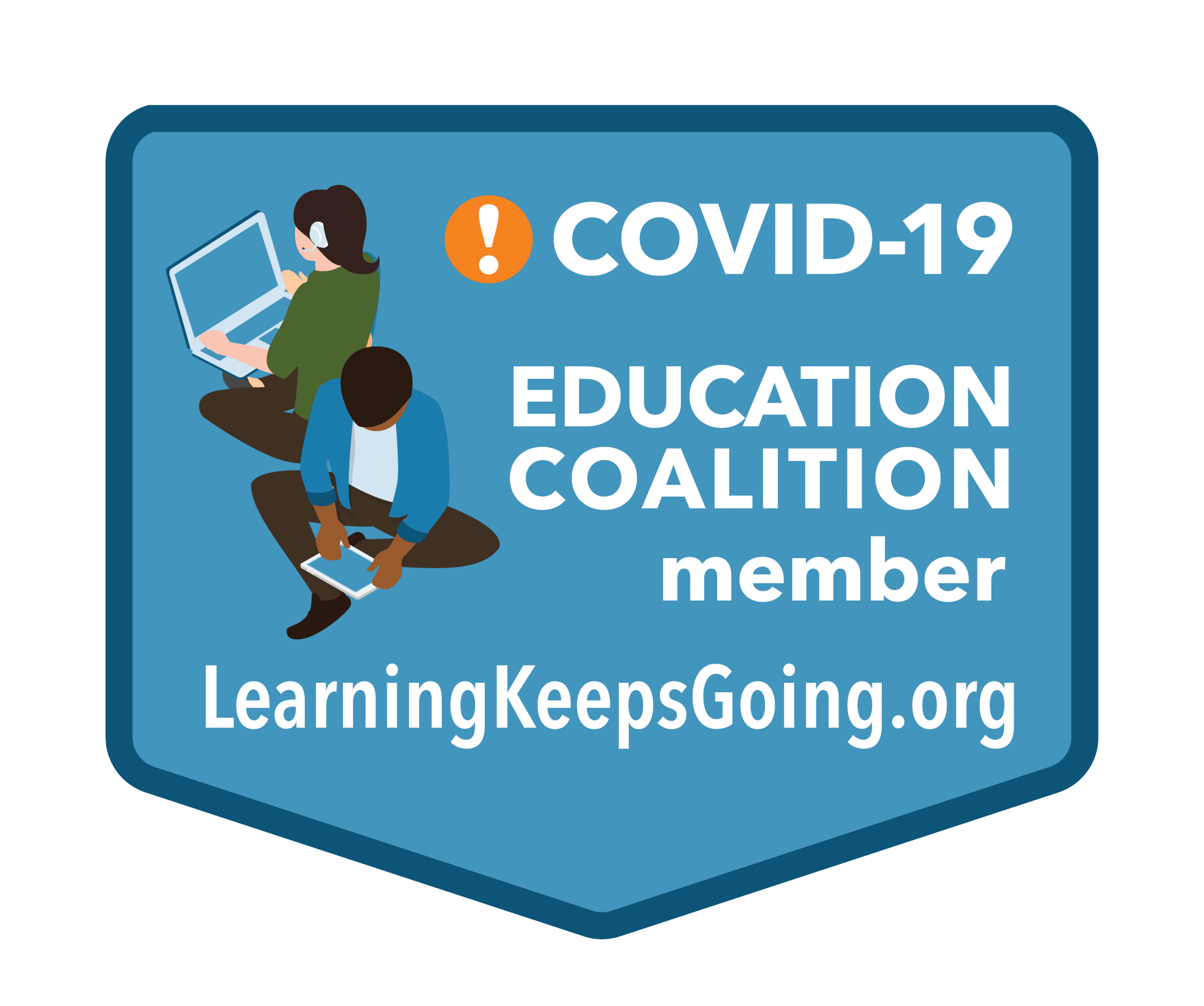 The undersigned members of the COVID-19 Education Coalition offer the following statement on the Delivering Immediate Relief to America’s Families, Schools and Small Businesses Act:
The undersigned members of the COVID-19 Education Coalition offer the following statement on the Delivering Immediate Relief to America’s Families, Schools and Small Businesses Act:
Our coalition is deeply concerned with the Delivering Immediate Relief to America’s Families, Schools and Small Businesses Act because of its low education funding levels, its fixation on physical reopenings of school buildings, and its failure to provide direct support for professional development in online learning. The bill would provide just $70 billion in additional K-12 education stabilization funds, a figure that is far short of the $200 billion that many educational groups feel is required to meet their needs. Additionally, we are concerned that the bill would condition receipt of two-thirds of this funding to the physical reopening of school buildings. This requirement ignores recent reports showing that 95% of districts plan to offer remote instruction to some degree, with about a third planning on remote instruction exclusively. This restriction makes no sense and will only adversely impact marginalized communities, including students of color, homeless students, students in foster care, and students with disabilities.
We also must note that this bill fails to provide separate funding for a key priority: professional development for online learning. Recently released studies point to the urgent need to support educators to deliver effective and equitable learning experiences. For example, more than one-fifth of educators have not received any training as it relates to technology-based remote instruction. A separate survey shows that a majority of novice educators do not feel well-prepared to provide online learning experiences for their students, as their preparation programs had not trained them on research-based technology integration frameworks.
08 Sep2020
By Jacqueline Rodriguez
AACTE has partnered with CoSN (The Consortium for School Networking) to provide school leaders with high-quality information on emerging issues and technology trends for K-12 innovation. Recently, the international advisory board of about 100 education leaders identified 15 key hurdles, accelerators, and tech enablers for schools to leverage in 2020 in order to drive innovation in K-12 education.
AACTE is proud to be a member of the advisory board for CoSN’s Driving K12 Innovation Project. The next generation of teachers and leaders are being prepared at our member institutions. In collaboration with our K-12 school district colleagues, educator preparation programs can leverage technology that supports the learning and social emotional growth of all our students.
CoSN and AACTE are committed to advancing progressive practices in the field and addressing challenges and opportunities such as data privacy and ownership, social emotional learning, and tools for privacy and safety online.
CoSN’s Driving K-12 Innovation
CoSN will issue its insights and findings from the advisory board in two individual free briefs. These publications, along with an implementation toolkit, are being released throughout 2020 to spur ongoing discussions and visibility that analyze the top hurdles, accelerators and technology enablers in K-12 education. This project is part of CoSN’s EdTechNext initiative, extending their long-standing work surrounding emerging technologies. The Driving K-12 Innovation initiative is supported by AACTE.
20 Jul2020
By Jane E. West

This blog post is written by AACTE consultant Jane West and is intended to provide updated information. The views expressed in this post do not necessarily reflect the views of AACTE.
Action Expected in July on Next COVID Relief Bill: Education in the Crosshairs
Beginning next week, we expect to see the Senate take up the next COVID relief bill. The House has passed their version of the bill and Senate Democrats have introduced their version of the bill, so the next move is up Senate Leader Mitch McConnell (R-KY). His bill may be unveiled next week.
Education has become a high profile and contentious matter for this bill, as the president has determined that the economy cannot move forward unless schools are fully open in person so that parents and college employees (and workers in related businesses) can return to work in person. Multiple agendas are woven through this debate, which will become even more prominent as decisions are made about whether to apply conditions to any further COVID relief funding for education.
16 Jul2020
By Katrina Norfleet
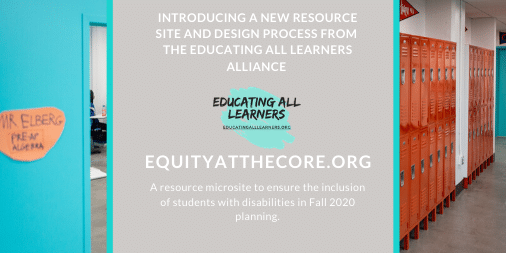
To support school leaders, teachers, students, and their families in coping with the changes brought by COVID-19, the Educating All Learners Alliance have worked with national experts and their 50-plus alliance partners, including AACTE, to develop a design process around nine critical questions to consider in reopening and recovery planning for fall 2020.
The equityatthecore.org microsite shares resources from partner organizations, hosts a discussion forum and outlines a design process to ensure that students with disabilities are not only a paragraph in the planning process but are at the center of the discussion about educating all learners to prioritize equity and inclusion.
AACTE members are encouraged to visit the site and explore this resource for administrators, teachers, and school communities. AACTE is proud to be a part of this uncommon alliance of organizations working with each other to support the recovery and reopening process.
16 Jul2020
By Ji Soo Song

The undersigned members of the COVID-19 Education Coalition offer the following statement on the Coronavirus Child Care and Education Relief Act (CCCERA) and FY21 federal education appropriations:
As states and districts continue preparing for the upcoming school year, national data reveal the critical need to support educators’ capacity to deliver effective and equitable online learning experiences. For example, a recent survey revealed discrepancies in the quality of instruction available to students from higher-income versus low-income families. Although the CARES Act provided some federal dollars to support educator professional development, experts agree that the current education stabilization funds are inadequate to fully support schools, students, educators, and families through the COVID-19 global pandemic.
13 Jul2020
By Katrina Norfleet
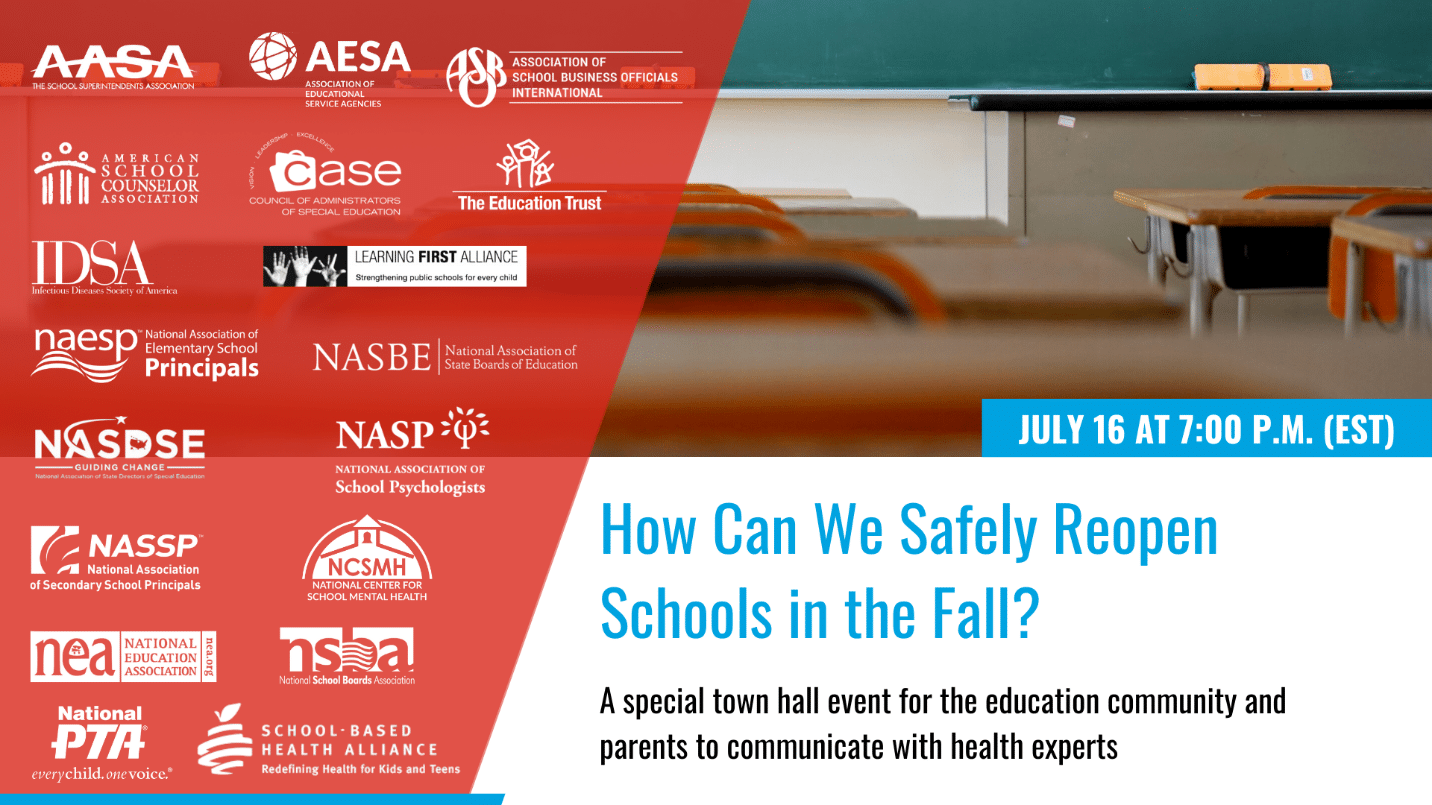
The education community and parents are invited to join a virtual town hall to talk with health experts about the re-opening of schools in the fall. The event, hosted by a group of national education organizations, will take place Thursday, July 16 from 7:00 – 8:15 p.m. ET.
When COVID-19 began its slow spread across the country, schools in every state shut their doors to help flatten the curve—and they stayed closed for in-person instruction through the rest of the 2019–20 school year. While businesses and other industries are beginning to reopen, it’s clear that the economy relies on our public education system for true recovery.
13 Jul2020
By Jane E. West
This blog post is written by AACTE consultant Jane West and is intended to provide updated information. The views expressed in this post do not necessarily reflect the views of AACTE.
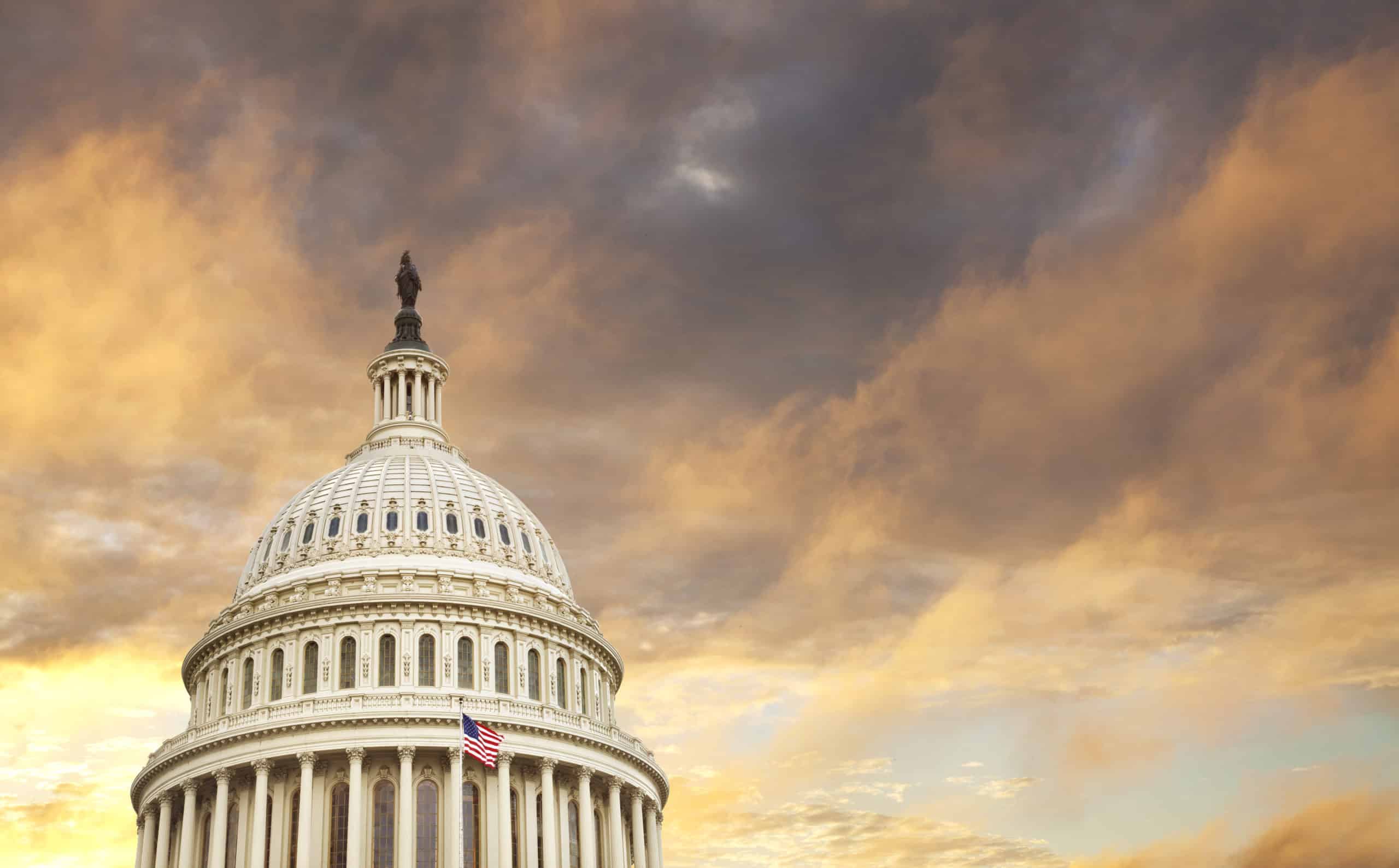
It’s been a busy — if not dizzying — week in DC – from movement on funding bills in the House to Trump Administration threats to withhold education funding and withdraw non-profit tax status from schools that do not fully open in the fall. The rest of July will likewise be action packed and fraught as Congress sprints to the August recess.
House Appropriations Subcommittee Adopts Education Funding Bill for FY 2021
On Tuesday, the House Subcommittee on Labor/HHS/Education Appropriations, chaired by Rep. Rosa DeLauro (D-CT), adopted a spending bill for FY 2021, which begins October 1.
Because the bill was required to stay within previously agreed upon budget caps, there were only modest increases for education. Overall, education spending was increased by 1.7%, or $1.2 billion, bringing federal education spending to a total of $73.5 billion.
25 Jun2020
By Jacqueline Rodriguez
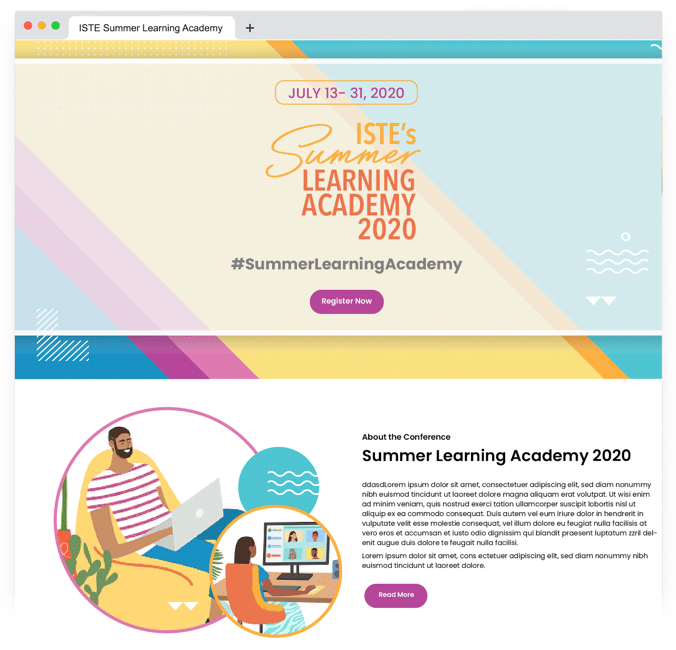 As we look toward fall 2020, it is clear that PK-12 schools will continue to use some blend of online and face-to-face learning as they deal with social distancing requirements and a possible resurge of COVID-19 cases. Teaching effectively with technology is now an essential competency for all educators.
As we look toward fall 2020, it is clear that PK-12 schools will continue to use some blend of online and face-to-face learning as they deal with social distancing requirements and a possible resurge of COVID-19 cases. Teaching effectively with technology is now an essential competency for all educators.
This summer provides a window of opportunity to deepen teacher candidates’ ability to effectively use technology to support learning. But that shift will not happen through checklists or tool training alone. Educators need explicit strategies and peer support. They also need professional learning experiences that will count towards their ongoing career development and continuing education credits.
To address these issues, AACTE is proud to team up with the International Society for Technology in Education (ISTE) to launch a Summer Learning Academy designed to prepare K-12 educators and teacher candidates for teaching in online and blended learning settings this fall.
This fun 3-week summer learning experience will provide the online teaching support educators have been asking for in a flexible format that meets their needs. Educators who successfully complete the program earn continuing education units (CEUs) and graduate-level credit.
16 Jun2020
By Jane E. West
 This blog post is written by AACTE consultant Jane West and is intended to provide updated information. The views expressed in this post do not necessarily reflect the views of AACTE.
This blog post is written by AACTE consultant Jane West and is intended to provide updated information. The views expressed in this post do not necessarily reflect the views of AACTE.
Police Reform in the Wake of George Floyd’s Death: Is it Coming? How Will it Affect Schools?
The purview of state and local government police reform is rapidly moving into the realm of the federal government. House Democrats have acted quickly, introducing a sweeping bill, the Justice in Policing Act of 2020 with 200 sponsors. Republicans in both the House and Senate are feeling the pressure and discussions are underway, albeit for a far more limited approach. The White House is sending mixed messages, on the one hand calling for reform and on the other, calling for law and order.
Sen. Tim Scott (R-SC) is taking the lead for Republicans in the Senate and has been in conversation with the White House. Rep. Jim Jordan (R-OH), a top Trump ally in the House, said he will release his own plan shortly. Senate proposals appear to feature the improvement of federal data collection on the use of force and no-knock warrants as well as police training. White House spokespersons said that ending qualified immunity, which protects police officers from civil lawsuits, was a nonstarter.
28 May2020
By Anna Arias, Brett Criswell, Joshua Ellis, Larry Escalada, Shelly Forsythe, Heather Johnson, Donna Mahar, Amy Palmeri, Margaret Parker and Jessica Riccio
COVID-19 challenges all of us in teacher education to reimagine how to prepare our candidates for the complexity of teaching when they cannot be placed in authentic classroom contexts. Our responses to this challenge will likely require us to stretch the “approximations of practice” that Grossman et al. (2009) described. One strategy that might offer us a means for executing this stretch is video analysis. However, for video analysis to be a meaningful approximation of practice, teacher educators need both useful video case resources and the tools to support candidates’ exploration of these cases.
A group of science teacher educators from across the country has been using the ATLAS library as our main video case resource and the Framework for Analyzing Video in Science Teacher Education (FAVSTE) as our tool for maximizing the learning from these cases. ATLAS has videos (generally 15 -20 minutes in duration) submitted by teachers applying for National Board certification, along with the commentary (Instructional Context, Planning, Analysis, Reflection) associated with the videos. This allows teacher candidates to both see the action occurring in actual classrooms and then read about the thinking of the teacher before and after the lesson that produced that action.
26 May2020
By Jane E. West
This blog post is written by AACTE consultant Jane West and is intended to provide updated information. The views expressed in this post do not necessarily reflect the views of AACTE.
How Will the Senate Respond to the House Passed $3 Trillion HEROES Act?
Last week the House passed its follow up to the $2 trillion CARES Act by adopting the HEROES Act— the next COVID-19 relief bill. The Senate does not appear to be in a hurry to act and has clearly articulated different priorities from those in the HEROES Act.
Educators and their congressional allies are weighing in for a strong infusion of cash for education in the next bill. In the House, Reps. Tlaib (D-MI), Hayes (D-CT) and Pressley (D-MA) are circulating a letter to their colleagues that requests $305 billion be targeted to K-12 education in the next COVID-19 bill. In comparison, the HEROES Act targets $58 billion to K-12 education. Many education organizations are supporting their request, including the National Education Association, American Federation of Teachers, and AASA: The School Superintendents Association.
On the higher education side, almost 80 education organizations have requested that the maximum for the Pell Grant be doubled, anticipating that students will be facing unprecedented struggles when starting the new academic year and beyond.
 CoSN, the national association of school district technology leaders, recently released two reports, Driving K-12 Innovation: 2021 Hurdles + Accelerators and Driving K-12 Innovation: 2021 Tech Enablers. The Driving K-12 Innovation reports capture the top nine topics (challenges, mega-trends, and tools), according to an advisory board of approximately 100 school leaders, technologists, educators, and changemakers. AACTE was proud to serve on the advisory board that supported the development of the report for the second year in a row.
CoSN, the national association of school district technology leaders, recently released two reports, Driving K-12 Innovation: 2021 Hurdles + Accelerators and Driving K-12 Innovation: 2021 Tech Enablers. The Driving K-12 Innovation reports capture the top nine topics (challenges, mega-trends, and tools), according to an advisory board of approximately 100 school leaders, technologists, educators, and changemakers. AACTE was proud to serve on the advisory board that supported the development of the report for the second year in a row.







 The undersigned members of the COVID-19 Education Coalition offer the following statement on the Delivering Immediate Relief to America’s Families, Schools and Small Businesses Act:
The undersigned members of the COVID-19 Education Coalition offer the following statement on the Delivering Immediate Relief to America’s Families, Schools and Small Businesses Act:




 As we look toward fall 2020, it is clear that PK-12 schools will continue to use some blend of online and face-to-face learning as they deal with social distancing requirements and a possible resurge of COVID-19 cases. Teaching effectively with technology is now an essential competency for all educators.
As we look toward fall 2020, it is clear that PK-12 schools will continue to use some blend of online and face-to-face learning as they deal with social distancing requirements and a possible resurge of COVID-19 cases. Teaching effectively with technology is now an essential competency for all educators. This blog post is written by AACTE consultant Jane West and is intended to provide updated information. The views expressed in this post do not necessarily reflect the views of AACTE.
This blog post is written by AACTE consultant Jane West and is intended to provide updated information. The views expressed in this post do not necessarily reflect the views of AACTE.